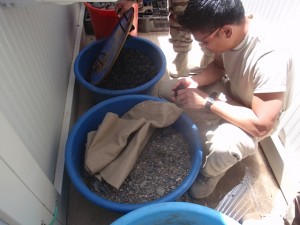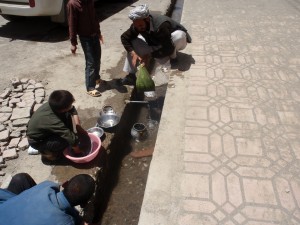Doctoral Candidate, US Army Major works on safer water for troops
When U.S. soldiers are fighting on the battlefield or behind enemy lines, they can encounter a challenge that’s almost as hazardous as enemy fire, air strikes or improvised explosive devices (IEDs): contaminated water. But a U.S. Army major is now enrolled in a PhD program at The University of North Carolina at Chapel Hill where he hopes to create a powerful new weapon to combat this threat for the military and others.
“Bad water can slow down and compromise a mission, hitting every man in the field. This becomes especially dangerous for troops in the Special Operation Forces (SOF) who are often operating behind enemy lines on missions where they have to be extremely mobile, quick and discreet,” says Jay Reyes, MPH, an active-duty U.S. Army Major and PhD student in the Environmental Sciences and Engineering Department at UNC’s Gillings School of Global Public Health. “Along with the immediate health complications, the water we are finding in countries like Afghanistan, Iraq and other under developed nations can produce long-term negative health effects on our troops. That’s why I’m doing this research.”
The research Reyes mentions is the subject of his PhD studies, which he is doing under the supervision of Mark Sobsey, PhD, Kenan Professor, environmental sciences and engineering. It involves the inherent quality of water troops ingest in the field, especially when it is needed by small, highly mobile teams traveling on foot, such as SOF.
“For these small teams we can either parachute in bottled water or troops rely on water they find along the way and use portable water purification systems to cleanse it,” Reyes says. “Parachuting water in is problematic, not always possible, especially in remote and mountainous terrain, and doing so often ends with nearly half or more of the water containers shattered and the water spilt. But small personal purification units are limited in their ability, as well, and are predicated on eliminating microbial threats. The result: any harmful chemicals in the water remain and are ingested by the soldiers.”
The military has responded by procuring what are called small unit water purifiers (SUWPs). However, while standards have been established for the mitigation of harmful microbial agents no such protocols exist for removing chemical agents. Nor is there a way to test whether manufactured SUWPs that claim to remove these chemicals do so effectively.
“This is the first study we’re aware of that looks at a broad range of chemicals as applied to their removal using point of use treatment processes,” says Dr. Sobsey. “It’s really an extension of work I’d done earlier in my career. I worked with the military in the 1980s on water purification systems, but those studies were predicated on anti-microbial efforts. Jay is taking the essential next step in this work by creating a tested, verified protocol for the efficacy of these units and the elimination of these harmful chemicals.”
The chemicals that have been encountered in the naturally available water in Iraq, Afghanistan and other places have included, but are not limited to, carcinogens, lead, cyanide, arsenic and mercury.
Reyes worked with U.S. Special Operations Command at Fort Bragg to identify five specific SWUPs that they have procured for small unit deployment. He will create a protocol that will identifying the safe amounts of broad range of harmful chemicals and test each unit’s effectiveness in removing them.
Establishing a reliable, safe protocol for the elimination of these chemicals will aid manufacturers and developers creating current and next generation iterations of these units. It will also greatly help the military in their evaluation of these units during the procurement process, which can save lives and potentially tens of millions of dollars.
“All this is being driven by the safety of our troops in the field. Safe drinking water means fewer problems in the short and long term,” Reyes says.
Reyes hopes to finish his PhD studies within three years. However, while the Army is funding the full price of his studies, he still needs to raise money for his actual hands-on research. He is exploring grant funding and other opportunities, but has also created a kick-starter site to aid in his efforts.
Reyes also notes that the end product and implications of his work extends far beyond the Special Operation Forces or the military.
“Getting safe drinking water to people in need is probably the most pressing, immediate public health issue in the world,” he says. “The results from this study will be available to help the WHO, the CDC, USEPA, FEMA, and disaster relief agencies and organizations, basically anyone who is looking to purify onsite water in remote or compromised locations,” he says. “By extending protocols to include microbial threats and dangerous chemicals, a lot of short and long term illnesses can be avoided and more people will be able to access safe drinking water in places where this otherwise would not be possible.
Dr. Sobsey has no doubt that Reyes will be able to generate a universal baseline chemical remediation protocol for SUWPs and other similar devices.
“Jay has all the intelligence, analytical capability and drive a doctoral candidate needs to do execute this study. He has also worked with these units and in these environments, so he understands through first-hand experience what is needed in the field,” says Sobsey. “It’s a really exciting and important project and I am confident that he will have a very successful product as a result of this research.”
.
Gillings School of Global Public Health contact: David Pesci, director of communications, (919) 962-2600 or dpesci@unc.edu.


